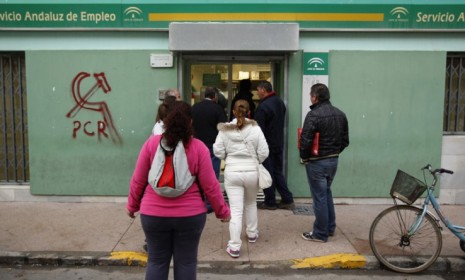6 reasons Spain could be Europe's next debt-crisis victim
Europe's fiscal crisis just won't die. And now malevolent market forces are hounding one of the continent's biggest economies

A free daily email with the biggest news stories of the day – and the best features from TheWeek.com
You are now subscribed
Your newsletter sign-up was successful
After a weeks-long lull, the European debt crisis is once again rearing its ugly head. This time, Spain is in trouble, and if you thought Greece was bad, you might want to avert your eyes for this one. Spain's economy is the fourth-largest in Europe, and it's twice as large as Greece, Ireland, and Portugal — all previous bailout recipients — combined. Spain's failure would likely spell the end of the eurozone, the 17 countries that use the euro currency, and would send shock waves through the global financial system. Here, six reasons Spain's economy is in trouble:
1. Rising debt
The Spanish government says its debt-to-GDP ratio will climb to 80 percent in 2012, a 20-year high. While that's lower than other troubled countries in the eurozone, the increasing amount of debt is a sign that Spain is struggling to cover its costs as a long-running recession eats away at its revenue base. As a result, the yields on Spanish bonds are steadily rising, making it even more expensive for Spain to borrow money, and pushing the nation toward a dangerous point where borrowing would become impossible.
The Week
Escape your echo chamber. Get the facts behind the news, plus analysis from multiple perspectives.

Sign up for The Week's Free Newsletters
From our morning news briefing to a weekly Good News Newsletter, get the best of The Week delivered directly to your inbox.
From our morning news briefing to a weekly Good News Newsletter, get the best of The Week delivered directly to your inbox.
2. Massive unemployment
Spain's unemployment rate is more than 23 percent, the highest in the eurozone. More worrisome is the nearly 50 percent jobless rate for Spaniards under 25, which has led young workers to leave the country in droves to find jobs in other European countries. Without enough workers receiving paychecks, the government can hardly hope to raise tax revenues needed to pay down its debt.
3. Not enough cost-cutting...
Last week, Spain unveiled an "extreme" budget that would cut $36 billion in spending. However, investors say the austerity measures, harsh as they are, fail to meet the government's previous deficit targets. In addition, some analysts are skeptical that local governments, which enjoy a degree of autonomy from the central government, will follow through on all the cuts.
A free daily email with the biggest news stories of the day – and the best features from TheWeek.com
4. ...And too much cost-cutting
More than 800,000 Spaniards took to the streets to protest the austerity measures, fearing that cuts would lead to layoffs. Many economists agree. That notion has become the central paradox of the European debt crisis: Brutal cost-cutting inevitably bumps up the jobless rate and slows down economic growth, and that virtually ensures the government won't be able to raise enough revenue by taxing businesses and workers.
5. The disastrous housing market
Prior to the global financial crisis of 2008, Spaniards flooded the housing market with gobs of cheap credit. If that sounds familiar, it's because the exact same scenario played out in the U.S., resulting in economic ruin once the bubble popped. Spain's housing bubble, however, played a more central role in the economy and was "the mother of all housing bubbles," says John Mauldin at Minyanville. With no end to the recession in sight, it will be hard for Spaniards to get out from under their staggering loads of personal debt.
6. The shaky stock market
The lingering effects of the housing market crash continue to weigh down banks, the construction industry, and the investment-services sector. As a result, Spain's stock market is "teetering on the edge of an outright meltdown," says Vincent Cignarella at The Wall Street Journal.
Sources: Financial Times, Guardian, MarketWatch, Minyanville, Wall Street Journal (2)
-
 How the FCC’s ‘equal time’ rule works
How the FCC’s ‘equal time’ rule worksIn the Spotlight The law is at the heart of the Colbert-CBS conflict
-
 What is the endgame in the DHS shutdown?
What is the endgame in the DHS shutdown?Today’s Big Question Democrats want to rein in ICE’s immigration crackdown
-
 ‘Poor time management isn’t just an inconvenience’
‘Poor time management isn’t just an inconvenience’Instant Opinion Opinion, comment and editorials of the day